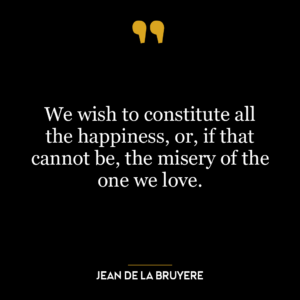This quote emphasizes the idea of reciprocity, a fundamental principle in many philosophies and religions, often encapsulated in the phrase ‘do unto others as you would have them do unto you’. It suggests that the key to personal happiness and love is not in seeking them directly for oneself, but in working to bring them to others. The act of giving, in this case love and happiness, is seen as a pathway to receiving the same.
The quote also reflects the concept of interconnectedness, suggesting that our personal well-being is tied to the well-being of others. By promoting love and happiness in others, we’re essentially creating an environment that’s conducive to our own happiness and love.
In the context of today’s world, this quote is particularly relevant. In an era marked by individualism and self-centeredness, the idea of finding personal fulfillment through the happiness of others is a refreshing perspective. It encourages us to be more empathetic, compassionate, and considerate.
For instance, in the workplace, instead of focusing solely on personal success, we can strive to create a positive and supportive environment for everyone. This could mean helping a colleague with a difficult task, acknowledging others’ achievements, or simply offering a listening ear when someone is going through a tough time.
In terms of personal development, applying this idea could mean shifting focus from self to others. This doesn’t mean neglecting self-care, but rather recognizing that our personal growth and well-being are intrinsically linked to the well-being of those around us. It could involve volunteering, mentoring, or just taking the time to help a friend in need.
In essence, this quote suggests that the path to personal love and happiness lies in our interactions with others, and in our ability to cultivate these positive emotions in the world around us.






